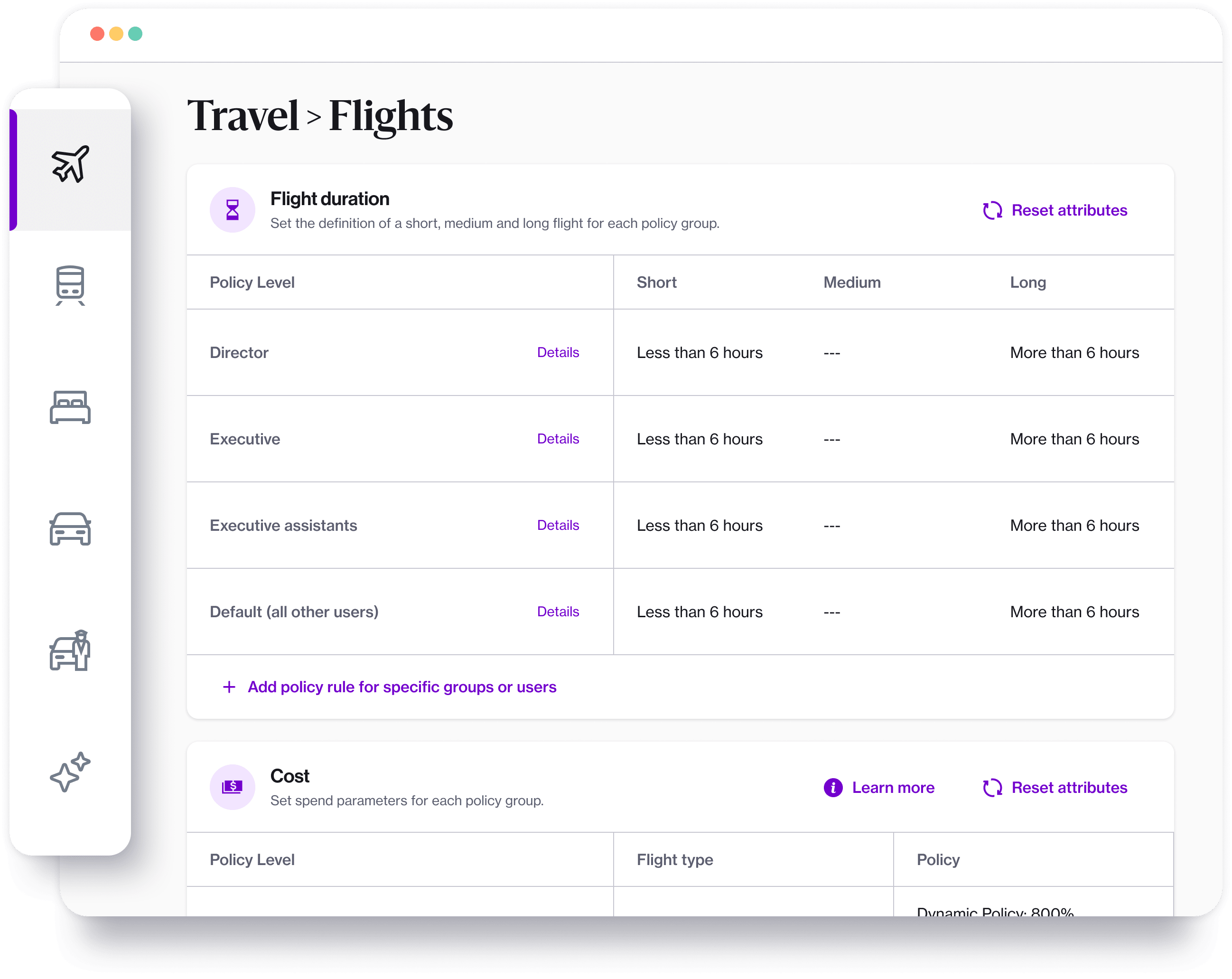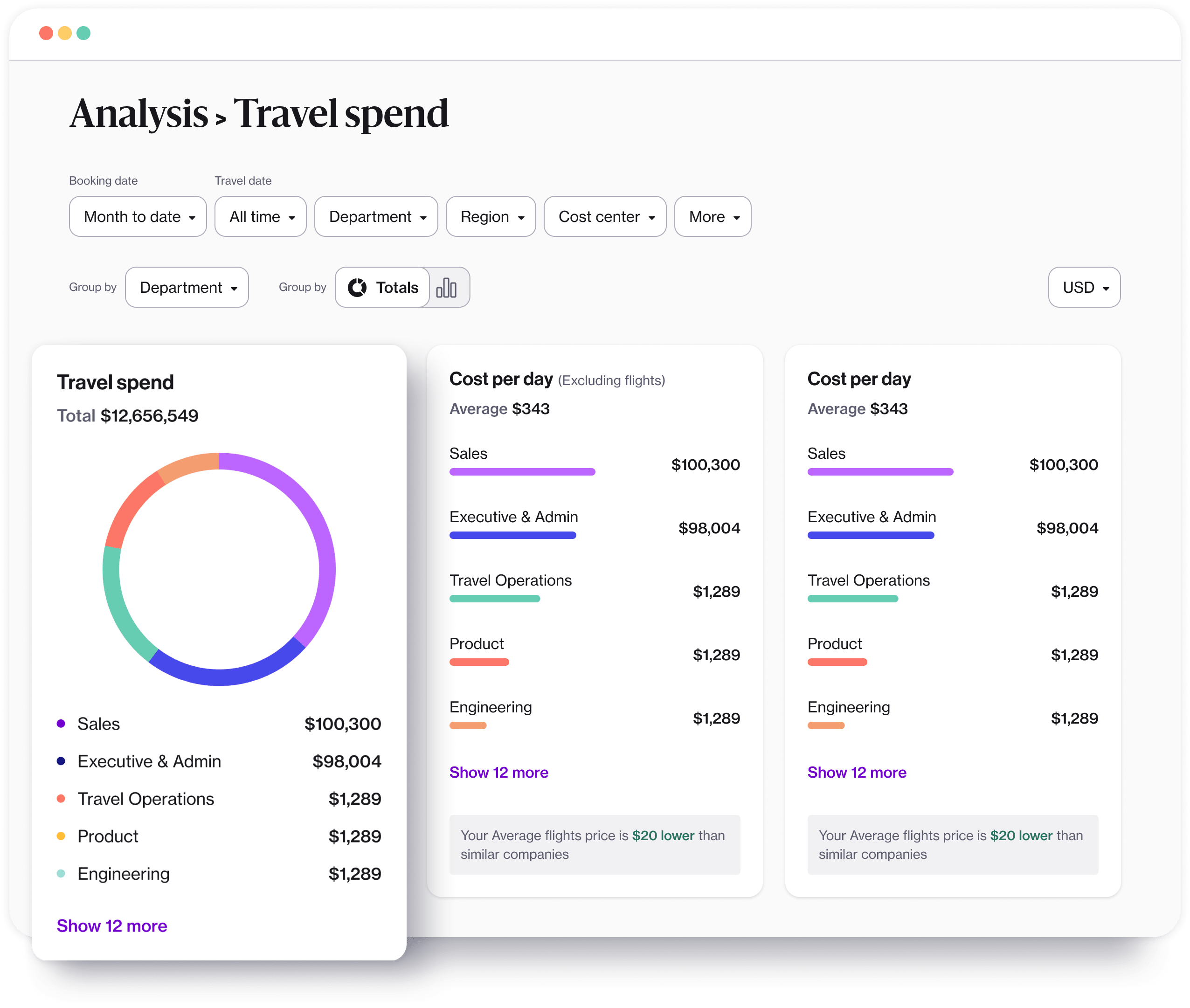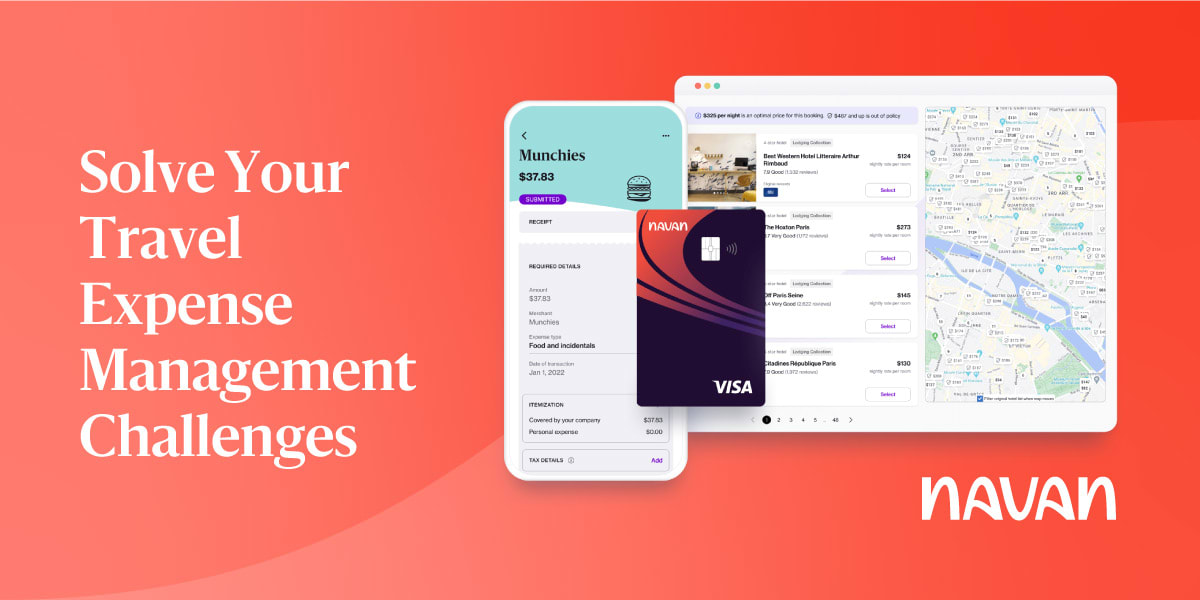The Complete Guide to Corporate Travel for Small Businesses

Have a growing company? Chances are its travel expenses are growing, too. Travel is consistently one of the top operational expenses for companies of all sizes. Small businesses looking to raise money, find customers, and hire top talent are no exception.
Implementing a corporate travel program can help small businesses get a handle on the expenses associated with travel. But where can they begin? Below are answers to the top questions small businesses have when starting a corporate travel program, along with links to additional resources.
What is corporate travel?
Corporate travel takes place when an employee travels on behalf of a company. Examples include traveling to:
- Attend a conference or business event
- Meet potential or current customers and suppliers
- Visit another office or branch of the same company
- Take part in an offsite or team event
Any business that has employees traveling for the company is participating in corporate travel—no matter how often the team travels or how many travel expenses they incur along the way.
Is corporate travel the same as business travel?
Yes. The term corporate travel is interchangeable with business travel.
Terms like corporate/business travel agent, corporate/business travel management, and corporate/business travel program all have the exact same meaning.

What are business travel expenses?
Business travel expenses are any costs incurred on business trips. These travel costs include:
- Airfare, car rental, or ground transportation
- Hotel/accommodations
- Food
- Other incidental expenses
Travelers either put charges on a corporate credit card or use a personal credit card and submit receipts for reimbursement from their companies.
What is a corporate travel program?
A corporate travel program sets the guidelines on how business travel will operate at a company. There are two types of corporate travel programs:
- Unmanaged travel is when employees book their own travel itinerary—flights, hotels, rental cars, or other accommodations—on whatever platform they choose.
- Managed travel is when a business enlists the help of a travel vendor to bring structure and cost savings to its existing corporate travel program.
Read More: Why Small Businesses Need Managed Travel Programs

What is corporate travel management?
Corporate travel management is the structure that a company has in place to oversee and facilitate business travel. In the past, businesses relied on travel agents to book business trips—a time-consuming and expensive process. Today, travel management has been streamlined and simplified thanks to online booking tools, travel management software, expense management technology, and mobile apps.
Read More: What to Look for in a Modern Corporate Travel Management Solution
What is a corporate travel policy?
A corporate travel policy is the set of parameters a company uses to manage employees’ bookings and spend when travelers are on the road.
The corporate travel policy is an important component of the company’s overall travel budget. When embraced companywide, these policies ensure that a business can control travel costs and give travel managers visibility into travel spend so they can better control the budget.
Read More: How Small Businesses Can Scale Travel & Expense Policy
What should a corporate travel policy include?
An effective corporate travel policy needs to account for the many varied types of travel that company employees undertake. Some of the fundamental pieces include:
- Details on what constitutes permissible travel and which employees can travel
- Spend limits and booking parameters for airline, rail, hotel, and rental car bookings
- Rules for ground travel, such as taxi cabs, ride shares, and public transportation
- Daily allowances for meals and other incidental expenses (aka per diems)
- Acceptable systems of payment for any expenses incurred during travel
- Processes for expense approval that employees and managers need to follow
- Processes for reviewing any exceptions
- Details on whether personal travel will be allowed in conjunction with business travel (also known as blended or bleisure travel)
- Allowable upgrades
In the past, travel policies typically lived in static documents that quickly became outdated. Today, technology has allowed companies to build flexible, dynamic, and effective travel policies. Navan displays a company’s corporate travel policy during the travel booking experience and automates policy compliance through its expense managment suite of technology. Travelers know immediately what expenses are appropriate, and travel managers can make updates to policies as situations and business needs change.
What is duty of care?
Duty of care is a company’s moral and legal obligation to care for employees while they're conducting business. From a global pandemic to a natural disaster, it’s crucial to prepare for the unexpected in business travel to manage risk, ensure business travel continuity, and protect employees on the road.
Allowing employees to make travel plans outside of a centralized, managed travel platform makes it impossible to know where travelers are at any given time. A realistic duty of care policy goes hand-in-hand with effective travel risk management.
In addition, a managed corporate travel platform should offer travel support that employees can reach out to if last-minute travel disruptions occur.
Read More: What Duty of Care Means for Travel Managers
What is a travel management company (TMC)?
A travel management company (TMC) is a corporate travel agency that helps organizations manage corporate travel programs. It provides travel management services such as:
- Fulfilling travel bookings
- Enforcing policy compliance
- Providing customer support
- Supporting duty of care obligations
- Providing real-time travel data
A TMC can also provide cost savings for companies through special, corporate-negotiated rates because of its connections with travel industry providers. Negotiating and maintaining similar corporate rates for a small business travel program would be complex and time-consuming.
As small businesses and startups grow, it’s not just travel expenses that become increasingly complex. That’s why, in addition to TMC capabilities, Navan can also manage all business spend via physical and digital cards that have the policy coded directly into them. Companies can reduce spend and save countless hours when cards, spend management, and travel are part of a single platform.
Read More: 5 Ways All-in-One T&E Software Sets Small Businesses Up to Scale

What is a travel management solution?
A travel management solution is software that manages all components of a company’s corporate travel program. It combines a travel booking platform and expense management tool to improve not only the booking process but the entire travel experience for employees.
A travel and expense solution like Navan can balance the needs of the individual traveler with the company's goals. It gives employees the power of choice when booking travel, and lets companies maintain control over costs as well as meet their duty of care obligations.
Read More: 6 Elements Small Businesses Need in a Travel Management Solution
Navan combines policy tools with a wealth of other benefits, making it the only solution a small business needs to future-proof its corporate travel program.
Ready to find out how Navan can benefit your small business? Get up and running in just 5 minutes.
This content is for informational purposes only. It doesn't necessarily reflect the views of Navan and should not be construed as legal, tax, benefits, financial, accounting, or other advice. If you need specific advice for your business, please consult with an expert, as rules and regulations change regularly.
More content you might like
Take Travel and Expense Further with Navan
Move faster, stay compliant, and save smarter.


